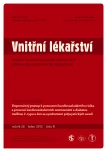-
Medical journals
- Career
Hyponatraemia associated with the syndrome of inappropriate antidiuretic hormone hypersecretion (SIADH) – options for treatment
Authors: M. Rudnay 1; P. Hrabčáková 2; I. Lazúrová 1
Authors‘ workplace: I. interná klinika Lekárskej fakulty UPJŠ a UN L. Pasteura Košice, Slovenská republika, prednostka prof. MUDr. Ivica Lazúrová, CSc. 1; Klinika geriatrie a ošetrovateľstva Lekárskej fakulty UPJŠ Košice a Vysokošpecializovaného odborného ústavu geriatrického sv. Lukáša Košice, Slovenská republika, prednosta doc. MUDr. Marián Sninčák, PhD., mim. prof. 2
Published in: Vnitř Lék 2012; 58(1): 52-55
Category: Reviews
Overview
Hyponatremia is the most common electrolyte imbalance in outpatients and hospital inpatients and the syndrom of inappropriate secretion of antidiuretic hormone (SIADH) is one of the common causes of euvolemic hyponatremia. Recent studies showed significantly higher mortality and morbidity of hyponatriemic patients compared to normonatriemic controls. Moreover the morbidity and mortality of hyponatremic patients significantly increases in nontreated in comparison to those with the therapy. Clinical consequences of hyponatremia in SIADH could be devided according to stage of the disorder. The cerebral oedema with its symptoms (letargy, weakness, nausea, coma) is the most dangerous clinical feature. Clinical symptoms of hyponatremia also depend on how rapid the change of natremia is. Therefore the early diagnosis of disturbance and treatement are necessary. Not only acute but also chronic hyponatriemia must be treated. In the correction the restriction of water intake, loop diuretics (together with hypertonic solution of NaCl), demeclocyclin, urea and litium can be used. The blockers of vasopresin receptors – vaptans are perspective in treatment of patients with hyponatremia.
Key words:
hyponatremia – syndrom of inappropriate secretion of antidiuretic hormone – vaptans
Sources
1. Dzúrik R, Fedelešová V. Poruchy bilancie vody a elektrolytov. In: Ďuriš I et al (eds). Princípy internej medicíny 2. časť. Bratislava: SAP 2001 : 1344–1348.
2. Hannon MJ, Thompson CJ. The syndrome of inappropriate antidiuretic hormone: prevalence, causes and consequences. Eur J Endocrinol 2010; 162 (Suppl 1): S5–S12.
3. Sajadieh A, Binici Z, Mouridsen MR et al. Mild hyponatremia carriers a poor prognosis in community subjects. Am J Med 2009; 122 : 679–686.
4. Gill G, Huda B, Boyd A et al. Characteristics and mortality of severe hyponatraemia – a hospital based study. Clin Endocrinol 2006; 65; 246–249.
5. Clayton JA, Le Jeune IR, Hall IP. Severe hyponatraemia in medical in-patients: aetiology, assessment and outcome. QJM 2006; 99 : 505–511.
6. Trejbalová Ľ, Podoba J. Syndróm inadekvátnej sekrécie antidiuretického hormónu. Interná Med 2005; 5 : 9–12.
7. Fenske W, Störk S, Blechschmidt A et al. Copeptin in the differential diagnosis of hyponatremia. J Clin Endocrinol Metab 2009; 94 : 123–129.
8. Fenske W, Allolio B. The syndrome of inappropriate secretion of antidiuretic hormone: diagnostic and therapeutic advances. Horm Metab Res 2010; 42 : 691–702.
9. Zietse R, van der Lubbe N, Hoorn EJ. Current and future treatment options in SIADH. NDT Plus 2009; 2 (Suppl 3): iii12–iii19.
10. Hoorn EJ, van der Lubbe N, Zietse R. SIADH and hyponatraemia: why does it matter? NDT Plus 2009; 2 (Suppl 3): iii5–iii11.
11. Verbalis JG, Barsony J, Sugimura Y et al. Hyponatremia-induced osteoporosis. J Bone Miner Res 2010; 25 : 554–563.
12. Sherlock M, Thompson CJ. The syndrome of inappropriate antidiuretic hormone: current and future management options. Eur J Endocrinol 2010; 162 (Suppl 1): S13–S18.
13. Schrier RW, Gross P, Gheorghiade M et al. Tolvaptan, a selective oral vasopressin V2-receptor antagonist, for hyponatremia. N Engl J Med 2006; 355 : 2099–2112.
14. Murphy T, Dhar R, Diringer M. Conivaptan bolus dosing for the correction of hyponatremia in the neurointensive care unit. Neurocrit Care 2009; 11 : 14–19.
15. Li-Ng M, Verbalis JG. Conivaptan: Evidence supporting its therapeutic use in hyponatremia. Core Evidence 2009; 4 : 83–92.
16. Sterns RH, Cappuccio JD, Silver SM et al. Neurologic sequelae after treatment of severe hyponatremia: a multicenter perspective. J Am Soc Nephrol 1994; 4 : 1522–1530.
Labels
Diabetology Endocrinology Internal medicine
Article was published inInternal Medicine

2012 Issue 1-
All articles in this issue
- The importance of contractile reserve in patients with resynchronization therapy
- A detailed study of colon polyps
- Endocrine changes in liver disease
- Common, standardized and recommended approaches in the diagnosis and monitoring of paroxysmal nocturnal haemoglobinuria using flow cytometry
- Light chain deposition disease
- Modes of tissue blood perfusion assessment by microdialysis – a review of current knowledge
- Hyponatraemia associated with the syndrome of inappropriate antidiuretic hormone hypersecretion (SIADH) – options for treatment
- A recommended approach to evaluate cardiovascular risk and to prevent cardiovascular diseases and type 2 diabetes mellitus in women with polycystic ovary syndrome
- Septic shock due to infective endocarditis of stimulation system of implantable cardioverter-defibrillator
- Lenalidomide induced therapeutic response in a patient with aggressive multi-system Langerhans cell histiocytosis resistant to 2-chlorodeoxyadenosine and early relapsing after high-dose BEAM chemotherapy with autologous peripheral blood stem cell transplantation
- Hyponatremia – carbamazepine medication complications
- Internal Medicine
- Journal archive
- Current issue
- Online only
- About the journal
Most read in this issue- Endocrine changes in liver disease
- Hyponatraemia associated with the syndrome of inappropriate antidiuretic hormone hypersecretion (SIADH) – options for treatment
- A detailed study of colon polyps
- Hyponatremia – carbamazepine medication complications
Login#ADS_BOTTOM_SCRIPTS#Forgotten passwordEnter the email address that you registered with. We will send you instructions on how to set a new password.
- Career

